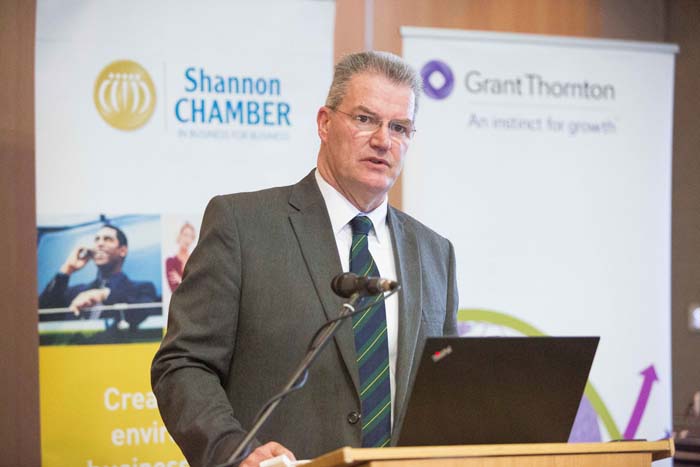
Fraud Knows No Boundaries and is a Real Threat for Business … Shannon Chamber Seminar hears
Patrick D’Arcy, director of forensic and investigation services with Grant Thornton. Photo: Eamon Ward.
There are no known cases of undetected fraud. This opening statement uttered by Patrick D’Arcy, director of forensic and investigation services with Grant Thornton when he stood up to address a recent business briefing at the Radisson Blu Hotel in Limerick made everyone sit up straight in their seats. This man had something important to say.
This thought-provoking breakfast briefing, organised by Shannon Chamber in association with Grant Thornton, proved to be a very insightful glean into the world of fraud in business, from trends to patterns and warning signs.
No stranger to fraud investigation, having spent over twenty years undertaking tax and fraud investigations for governmental, regulatory and not-for-profit organisations and, having completed many employee investigations involving large and complex transactions where significant funds have been obtained using spurious payments, Patrick D’Arcy is well versed in the most complex frauds involving multi-jurisdictions and international dimensions.
“Fraud is ten times worse than people realise. It’s so common now and sometimes it’s so simple, it’s frightening,” he said citing live examples at the end of his every sentence and alarming his audience of astute business people even more.
“Most frauds are preventable and happen because of sheer lack of control, or weaknesses that have been identified in internal controls, in a business by an unscrupulous individual(s),” he said.
“Everyday controls such as analysing where potential threats are, controlling and maintaining safe environments for employees, ensuring that key confidential data is not dumped into a green bin for recycling, destroying whether by accident or design rather than keeping hand-written critical meeting notes, or handing out credit cards based on trust without strict terms and conditions or controls as to their use, can leave an individual/company open to fraud.
“Most people in business don’t set out to commit fraud but often do so due to some personal circumstances out of their control. It’s important therefore to watch out for any change in employees’ habits, character or issues affecting them which might trigger fraudulent activity.
“In today’s technologically advanced operating environment, business owners need to always be, but not obsessively, conscious of who could be committing fraud internally and question if they are providing the opportunity for them to do so.
“Fraud can have a huge impact on an organisation as a whole; it’s best therefore that companies demonstrate that, as a preventative measure, they at least have internal controls to eliminate the threat,” he said.
Reacting to Mr. D’Arcy’ presentation, Shannon Chamber’s chief executive Helen Downes said: “I am not surprised that this was a topic our members wanted us to address. You just never know where or how you might leave your company exposed to fraud, particularly online. Everyone left the briefing with a heightened awareness of the type and level of controls they need to have in place for their particular circumstance. It was a most thought provoking event and the take-away was: know who you’re working for and who is working for you.”

Patrick D’Arcy, director of forensic and investigation services, Grant Thornton (centre) pictured at the seminar with Julie Dickerson, president, Shannon Chamber and Damian Gleeson, partner in charge, Grant Thornton Limerick. Photo: Eamon Ward.
